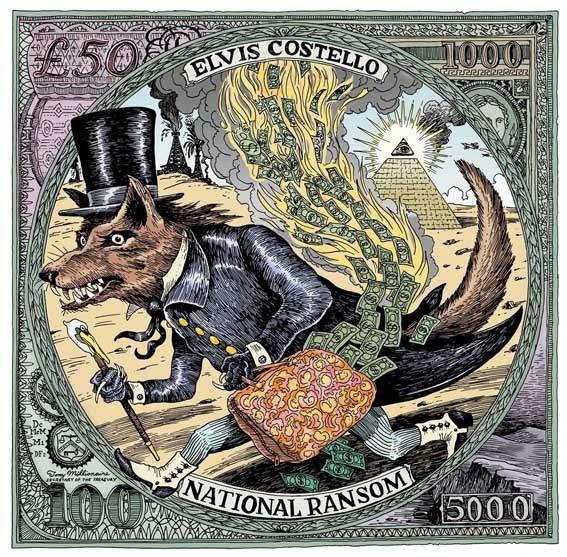
News
HMS Is Facing a Deficit. Under Trump, Some Fear It May Get Worse.

News
Cambridge Police Respond to Three Armed Robberies Over Holiday Weekend

News
What’s Next for Harvard’s Legacy of Slavery Initiative?

News
MassDOT Adds Unpopular Train Layover to Allston I-90 Project in Sudden Reversal

News
Denied Winter Campus Housing, International Students Scramble to Find Alternative Options
‘National Ransom’ Reaches Ambitious Heights
Elvis Costello -- "National Ransom" -- Universal -- 4 STARS

There is no reason that Elvis Costello’s latest should be able to stand alone as an album, given that each song draws from different musical genres and time periods. Yet somehow, the veteran composer and songwriter pulls it off. “National Ransom” undoubtedly jumps around, but it is such a pleasurable journey that one can forgive the bumps in the road.
Costello’s second collaboration with producer T-Bone Burnett features upwards of 30 musicians. Each song on this wildly ambitious album draws from the sound of a particular era—the tracks often have settings as specific as a drawing room in Pimlico, London, 1919. The title song, “National Ransom,” is set in the present day. It addresses the recent government bailouts of major corporations, whose bill was footed by the average taxpayer. It echoes sounds of the early 1930s, the last time a similar crisis occurred. Costello belts, “We’re working every day / Paying off the national ransom.”
Because of its sweeping scope, the album can sound disjointed at first. But most tracks are so well executed that Costello gets away with the lack of unity. By far the best track on the album is “Jimmie Standing in the Rain,” a triumph of musical scene-setting. It tells the story of an English cowboy singer riding dreary trains from music hall to music hall. Costello bemoans his sorry fate, “Nobody wants to buy a counterfeited prairie lullaby in a colliery town / A hip flask and fumbled skein with some stage door / Josephine is all he’ll get now.” Costello’s deep bass and the accompanying violins and trumpets give the track a wonderfully melancholy air. It is as though one can see the rain streaking the grimy windows of the Lancashire station where Jimmie awaits the train.
Another well-executed experiment is Costello’s flirtation with Bluegrass. “A Slow Drag with Josephine” and “Dr. Watson, I Presume” sound like Costello meets the Coen brothers’ Soggy Bottom Boys. “A Slow Drag with Josephine” even concludes with a minute of whistling. Alongside these rather uncharacteristic tracks are a couple examples of a sound Costello has explored before, marked by low, grumbling vocals, simple instrumentation, and prominent percussions. “Church Underground” is one of a handful of tracks on the album that address Catholicism. Interestingly, Costello seems to revert to his classic sound on these religiously inspired tracks. This reflection of an earlier musical style seems to parallel Costello’s reference to another aspect of his past, namely his Catholic upbringing.
These tracks that pay tribute to a former time feature some of the finest writing on the album. Costello is a master lyricist, and he is at his finest on “Stations of the Cross,” where he offers his own take on Jesus’s martyrdom, singing, “He’s buying his way into heaven I suppose / He weeps at the blows.” Though these are standout tracks, Costello’s aptitude with words shines throughout the album. “Dr. Waton, I Presume” is particularly poetic. Its opening verse sets the tone, “This black and clipped misshapen thing / Hobbling on from claw to ring / Hung upside down and cawing / Pecking at carrion of the fallen battalion thawing.”
Costello could be forgiven for running out of steam at this point in his 40-year career, but if anything, this album suffers from an excess of ambition. “National Ransom” is monumental at 16 tracks long. Costello is talented enough to pull off the mammoth task he has set for himself, but at times the project seems to be a bit of a stretch. The album drags on some of the slower tracks like “One Bell Ringing” and “All These Strangers.” Still, “National Ransom’s” faults are easy to overlook in sight of its achievements. The album’s most remarkable feature is Costello’s ability to convincingly mimic many disparate musical styles. The tracks never sound showy or contrived, despite the fact that some, like “Jimmie Standing in the Rain,” are obviously meant to be theatrical.
“Album” may be the wrong word, even a reductive word, to describe “National Ransom.” It is simply a collection of songs that Costello penned with T-Bone Burnett. The album has little focus and even less cohesion, which can be problematic in other cases. However, there is a single thread that ties together Costello’s latest work, and it is the high standard of creativity and ambition laced through every track.
Want to keep up with breaking news? Subscribe to our email newsletter.
